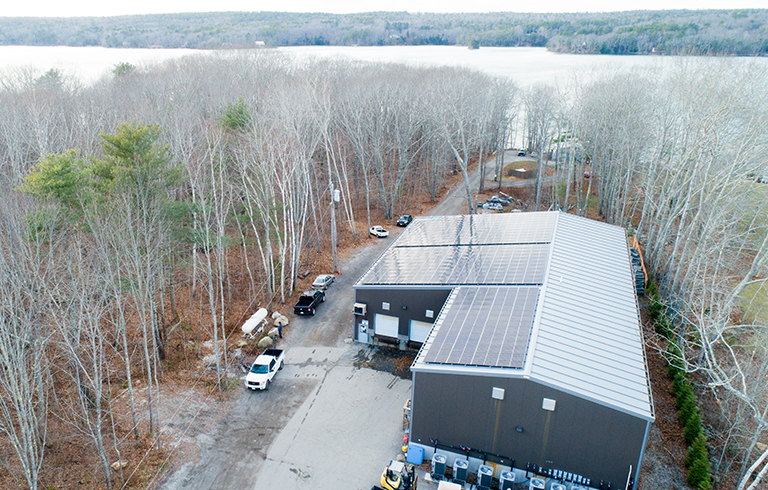What if I told you your marine business could shift electrical costs from ongoing operations to capital costs and, by doing so, could pay next to nothing for electricity within ten years? And what if doing so would cut carbon pollution too?
This is not some environmental fantasy, but the actual results that businesses along the coast of Maine are seeing as they pursue clean energy transitions—shifting from more polluting to renewable energy sources and becoming more energy efficient. In our What Works Solutions Library, the Island Institute has collected examples of innovation from communities in rural Maine and beyond. We’ve documented their process, so that anyone can read, learn, and act based on the successes and learnings of community leaders and problem solvers who faced similar challenges. The most recent entries focus on Maine working waterfront businesses that are testing the waters of renewable energy systems and finding payoffs.
“Our energy efficient systems help our bottom line substantially, but reducing our carbon footprint and helping mitigate climate change in itself is enough to make it worth it for us.” – Steve Zimmerman, Facilities Manager, Mook Sea Farm
We know it’s easy to focus on the costs of climate action, but we heard consistently how these clean energy projects were good business decisions. You’ve already heard from me on the challenges that energy use presents to coastal businesses, but we’ve now compiled three experiences from successful businesses across the coast that demonstrate how climate-friendly energy solutions not only save money, but just make good business sense.
Through our Solutions Library, we documented conversations with:
- A yacht yard (which added battery storage to their solar project to reduce peak demand charges and also purchased electric vehicles and charging stations)
- A shellfish aquaculture farm and hatchery (which moved significant operations indoors to reduce variability in water quality due to flooding events and installed solar and energy efficient equipment)
- A lobster co-op (which installed solar on their roof to produce more electricity than they currently use)
All of these stories show how investments in clean energy are already paying off and helping businesses cut costs and prepare for the future.
“Climate change is getting worse and worse, and at the Cranberry Isles Fishermen’s Co-op we take that seriously…It was a driving factor for us…By 2027, we’ll also be getting next-to-free electricity.” – Mark Nighman, Co-op Manager, Cranberry Isles Fishermen’s Co-op
Our effort to encourage and support clean energy transitions for Maine’s coastal businesses is one of the pillars of the Island Institute’s recently-announced partnership with Luke’s Lobster. It is also a fundamental tenet of the State’s recently released Maine Climate Action Plan, “Maine Won’t Wait,” that notes that “addressing climate change presents transformational economic opportunities” for people, businesses, communities, and the state as whole. The Maine Seafood Business Council proposed in the plan will be tasked with ensuring that Maine’s marine businesses have the tools and support they need to cut carbon emissions while saving money, but the stories in our library highlight the fact that we don’t need to wait for the Business Council to be established to see how this works.
“If you’re going to be in business longer than the payment period on the loan, solar makes sense. It’s a long game, but it pays off.” – Gabe Pendelton, Pendleton Yacht Yard
The three businesses highlighted in our library represent the early adopters who are demonstrating clean energy solutions for the marine economy, and we can’t wait to support more businesses in benefiting from these climate-friendly actions. Share with us how you’ve been inspired and want to take part, and explore the Solutions Library to find more resources on clean energy in your homes, businesses, and communities.


